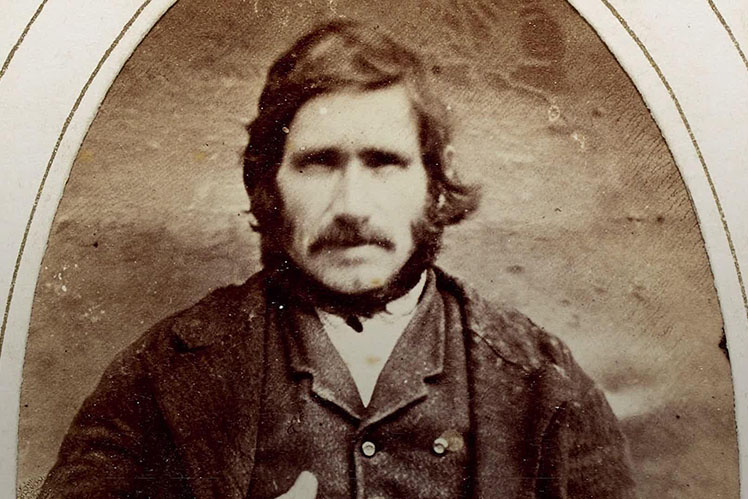Presidential pardon in 1882 murder case after UCD expert review

Pictured: Myles Joyce who has been pardoned by President Michael D Higgins for his wrongful conviction for murder in the 1882 Maamtrasna case. (Image courtesy of the National Library of Ireland)
Posted: April 06, 2018
An innocent man hanged for the murder of five members of the same family in 1882 has been pardoned by President Michael D Higgins following a review of his case by UCD legal expert Dr Niamh Howlin.
The (opens in a new window)review of the trial of Mr Myles Joyce was commissioned in 2015 by then Taoiseach and Co Mayo TD Enda Kenny.
The case had been considered by many historians as one of the greatest miscarriages of justice in British legal history. The pardon issued to Co Galway man Myles Joyce is the first for a conviction that was handed down before the foundation of the Irish state.
Above: a trailer from a TG4 documentary on the Maamtrasna case
In late 1882, Myles Joyce (Maolra Seoighe in Irish) was wrongfully convicted and hanged for the brutal murder of five members of a family, also named Joyce, in their homes at Maamtrasna, Co Mayo. Relatives of Myles Joyce had long campaigned to have the case revisited.
Joyce, a father of five in his 40s, was hanged along with two other men for the murders. His co-accused, Patrick Joyce and Patrick Casey, admitted their guilt for the crimes but emphasised Myles Joyce’s innocence shortly before the three were executed in Galway Gaol.
The admissions were not deemed sufficient to save Joyce from the hangman’s noose by the Lord Lieutenant of Ireland, Earl Spencer, Britain’s chief governor of Ireland.
The legal review concluded that several aspects of Joyce’s trial, conviction and execution were “unfair by the standards of criminal justice at the time”.
Dr Niamh Howlin from the UCD Sutherland School of Law found a number of factors including the “doubtful reliability” of witness evidence in the case meant the crown’s prosecutors had failed to give Myles Joyce a fair trial.
Video:
— President of Ireland (@PresidentIRL) (opens in a new window)April 5, 2018
President Michael D. Higgins signed a warrant granting a posthumous pardon to Mr. Myles Joyce, wrongly convicted in 1882.(opens in a new window)https://t.co/UlTPF5S4N6 (opens in a new window)pic.twitter.com/NSna4sC8b8
The court proceedings were conducted solely in English and this deprived the Irish-speaking Joyce of his opportunity to be tried before Irish-speaking jurors, the report notes. There was also no translation of the proceedings for the defendants, who understood little English.
“The result of this was that he was unable to adequately understand and participate in his own trial,” the report states.
It also found the fact that the court did not allow the sole surviving witness of the crime, 10-year-old Patsy Joyce, to testify in the trial was crucial to Myles Joyce’s wrongful conviction.
“Had the testimony of Patsy Joyce been admitted, it would have significantly weakened the prosecution’s case…The failure to do this adversely affected the fairness of Myles Joyce’s trial,” the report states.
“Rather than a single issue rendering the trial of Myles Joyce unfair, a combination of factors meant his trial was unfair by the standards of late nineteenth-century criminal justice.”
Only four presidential pardons, and only two posthumous pardons, have been granted in the Republic of Ireland since 1937.
By: Jamie Deasy, digital journalist, UCD University Relations






